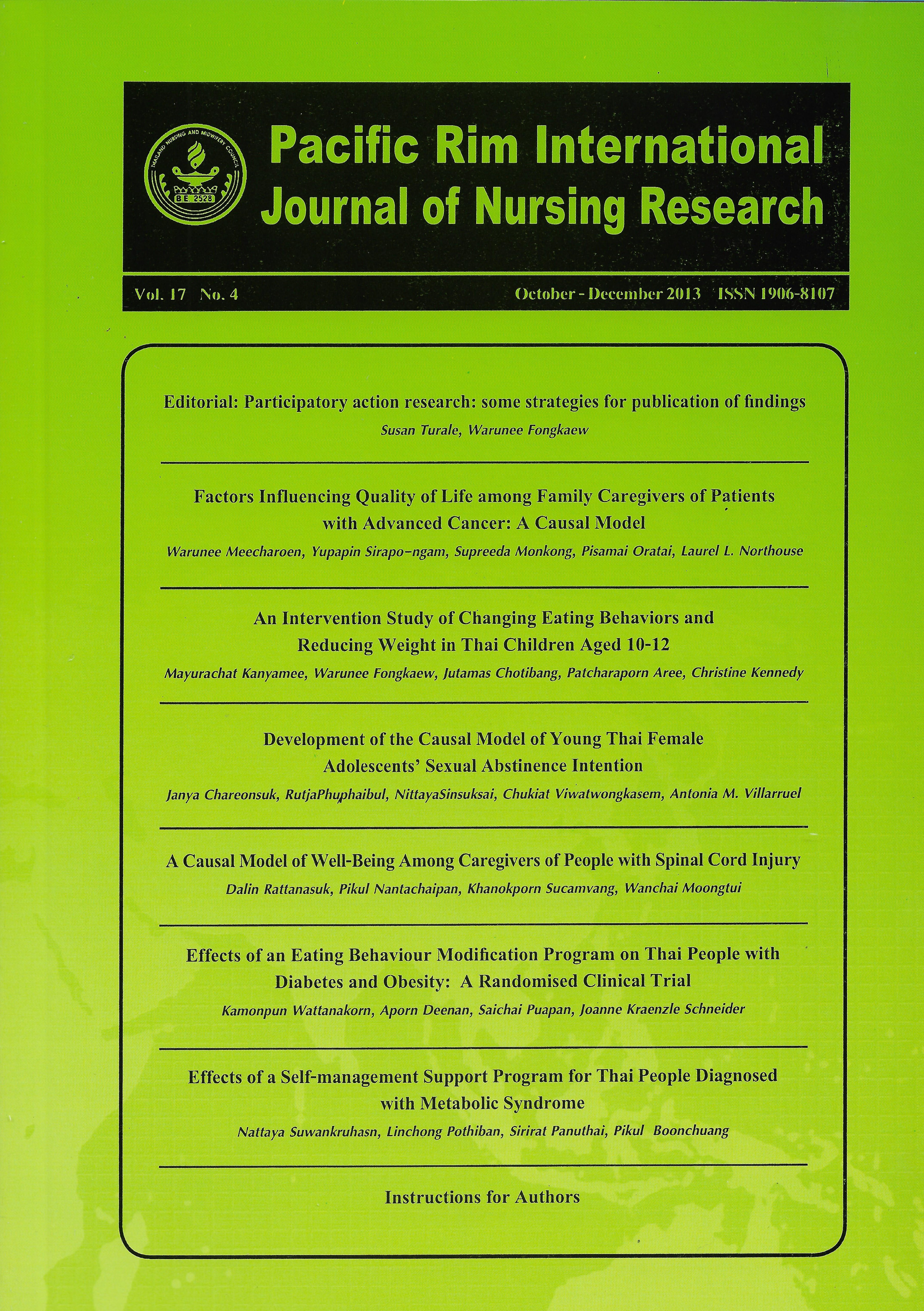Factors Influencing Quality of Life among Family Caregivers of Patients with Advanced Cancer: A Causal Model
Keywords:
family caregiver, advanced cancer, quality of life, social support, Caregiver burden, causal modelAbstract
A decrease in the quality of life among family caregivers of advanced cancer patients negatively influences the quality of care provided. Thus, evaluating caregiver quality of life and related factors is very significant because it can guide nurses to maintain health status and ability of caregivers to provide caring for their loved one. This study, based on the Stress Process Model, examined causal relationships among caregiver’s age, education, income, caregiver burden, family hardiness, coping, social support, and quality of life among family caregivers of patients with advanced cancer. A sample of 275 caregivers was recruited from two tertiary hospitals in the Central Region of Thailand. Data were collected via seven questionnaires including a demographic data questionnaire, the Zarit Burden Interview, the Family Hardiness Index, the Jalowiec Coping Scale, the Social Support Questionnaire, and the Ferrans and Powers Quality of Life Index Cancer Version-III and analyzed through use of descriptive statistics and path analysis.
The final model of factors influencing quality of life among family caregivers of patients with advanced cancer fitted the empirical data and explained 45% of the variance in caregiver quality of life. The results also indicated caregiver age, social support and family hardiness had significant direct positive effects on caregiver quality of life; whereas, burden had a significant negative direct effect on this, and an indirect effect through social support and family hardiness. The findings suggest that nurses should develop a program focused on reducing burden, enhancing caregivers’ support and family hardiness, and helping them to maintain their quality of life. However studies to evaluate this program are needed test this causal model in other populations in Thailand.
บทคัดย่อ: วัตถุประสงค์ของการวิจัยครั้งนี้เพื่อศึกษาความสัมพันธ์เชิงสาเหตุของอายุ ระดับการศึกษา รายได้ ภาระในการดูแล ความเข้มแข็งของครอบครัว วิธีการเผชิญความเครียด แรงสนับสนุนทางสังคม และคุณภาพชีวิตของญาติผู้ดูแลผู้ป่วยมะเร็งระยะลุกลาม กรอบแนวคิดที่ใช้พัฒนามาจาก stress process model และการทบทวนวรรณกรรม กลุ่มตัวอย่างคือญาติผู้ดูแลผู้ป่วยมะเร็งระยะลุกลาม จำนวน 275 คน ที่มารับบริการ ณ โรงพยาบาลระดับตติยภูมิ ในสังกัดกระทรวงสาธารณสุข จำนวน 2 แห่งเก็บรวบรวมข้อมูลโดยใช้แบบสอบถามจำนวน 6 ชุดคือข้อมูลส่วนบุคคล แบบสอบถามภาระในการดูแล ดัชนีความเข้มแข็งของครอบครัว การเผชิญปัญหา แรงสนับสนุนทางสังคม และดัชนีคุณภาพชีวิตวิเคราะห์ข้อมูลโดยใช้สถิติขั้นพื้นฐาน และการวิเคราะห์อิทธิพลเชิงสาเหตุ
ผลการศึกษา พบว่า แบบจำลองสุดท้ายที่ปรับมีความสอดคล้องกับข้อมูลเชิงประจักษ์และสามารถทำนายความผันแปรของคุณภาพชีวิตของญาติผู้ดูแลผู้ป่วยมะเร็งระยะลุกลามได้ 45% โดยอายุ แรงสนับสนุนทางสังคมและความเข้มแข็งของครอบครัวมีอิทธิพลโดยตรงทางบวกต่อคุณภาพชีวิต ภาระในการดูแลมีอิทธิพลโดยตรงทางลบต่อคุณภาพชีวิต และมีอิทธิพลทางอ้อมต่อคุณภาพชีวิต ผ่านแรงสนับสนุนทางสังคม และความเข้มแข็งของครอบครัว ผลการวิจัยชี้ให้เห็นว่าในการจัดโปรแกรมการดูแลสำหรับญาติผู้ดูแลผู้ป่วยมะเร็งระยะลุกลามควรจัดโปรแกรมที่มุ่งส่งเสริมให้ญาติผู้ดูแลได้รับการสนับสนุนทางสังคมและมีความเข้มแข็งของครอบครัวเพิ่มขึ้น ลดภาระในการดูแล และคงไว้ซึ่งการมีคุณภาพชีวิตในระดับสูงในช่วงสองปีแรกของการดูแล นอกจากนี้ควรจะมีการศึกษาวิจัยในระยาวหรืองานวิจัยเชิงทดลองต่อไปในอนาคต
Downloads
Published
How to Cite
Issue
Section
License
Copyright: The Pacific Rim International Journal of Nursing Research, Thailand Nursing & Midwifery Council has exclusive rights to publish, reproduce and distribute the manuscript and all contents therein.








.png)



